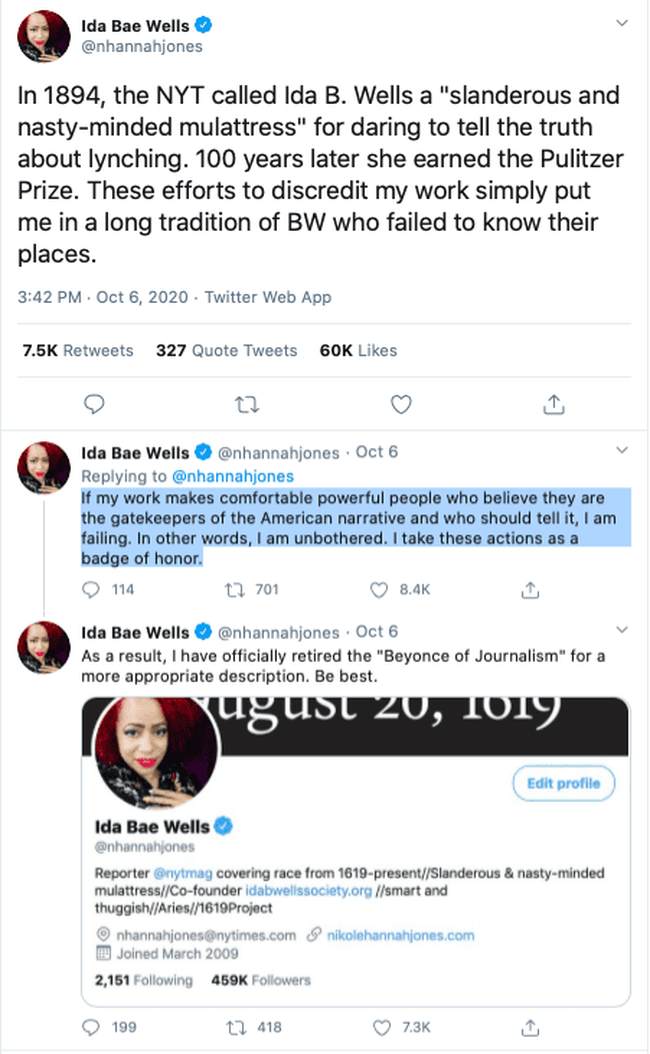On Thursday, The New York Times published an essay critical of its “1619 Project.” Bret Stephens, a writer of the sort that passes for conservative at The Times, wrote a painfully balanced rebuke of the 1619 Project, arguing that the project and its founder, Nikole Hannah-Jones, were not truly anti-American but admitting that the project and its founder made serious errors in judgment that ended up dooming the project. The Times‘ leadership issued statements praising the 1619 Project, but Hannah-Jones appears to have lashed out with something of a tantrum, anyway.
On Tuesday, The Washington Post revealed the internal machinations of The Times — and Hannah-Jones’ response, essentially accusing The Times of racism.
“Times leadership took pains to praise the 1619 Project this weekend. They maintained that Stephens’s criticism represented not an institutional scolding of the project but [a] commitment to thoughtful debate,” the Post reported. NYT Acting Opinions Editor Kathleen Kingsbury said, “The Times’s openness to hear and tolerate criticism is the clearest sign in its confidence in the work.”
“Hannah-Jones, though, was livid. She sent vitriolic emails to both Kingsbury and Stephens ahead of publication. She also tweeted that efforts to discredit her work ‘put me in a long tradition of [Black women] who failed to know their places,'” the Post explained. “She changed her Twitter bio to ‘slanderous and nasty-minded mulattress’ — a tribute to the trailblazing journalist Ida B. Wells, whom the Times slurred with those same words in 1894.”
Speaking to the Post, the 1619 Project founder finally admitted she had made a key mistake. She had notoriously claimed that American patriots had rebelled against Britain in order to preserve slavery — a claim for which there is no evidence, and a good deal of evidence to the contrary. Historians repeatedly called her out on this, and The Times eventually issued a correction.
Scholars Demand Pulitzer Board Revoke Prize Over ‘Glaring Historical Fallacy’ in 1619 Project
Belatedly, Hannah-Jones admitted she should have consulted with scholars who had a particular focus on colonial history, the Revolutionary War, and the Civil War.
“I should have been more careful, because I don’t think that any other fact would have given people the fodder that this has, and I am tortured by it,” she said. “I’m absolutely tortured by it.”
🚨🚨 Editor’s Note: It’s time for conservatives to stand together and fight big-tech censorship. Join PJ Media VIP and use the promo code CENSORSHIP for 25% off your VIP membership. 🚨🚨
The Post did not report whether or not Hannah-Jones said she was “tortured by” lying about something else, however. Hannah-Jones and the 1619 Project had claimed that America’s true founding came in 1619, with the arrival of the first slaves (who actually arrived far earlier), rather than in 1776, with the Declaration of Independence. Last month, however, both Hannah-Jones and the Project apparently deep-sixed this claim, deleting the language from the website. Hannah-Jones even went on television and lied, claiming she had never made such a claim.
In fact, scholars have demanded the Pulitzer Prize board revoke Hannah-Jones’ Pulitzer Prize over these lies.
Bret Stephens’ column called out these lies, arguing that “the 1619 Project has failed.” While Stephens praised Hannah-Jones and defended her against some critics, he pointed out that the founder’s “monocausality” — an insistence on reinterpreting American history through the lens of slavery and its legacy alone — led her to make massive mistakes that destroy her own project. He even noted the fact that rioters painted “1619” on a toppled statue of George Washington.
Rather than engaging civilly with this important criticism, Hannah-Jones accused her employers of racism. Her tweet thread is even worse than the Post reported.
“In 1894, the NYT called Ida B. Wells a ‘slanderous and nasty-minded mulattress’ for daring to tell the truth about lynching. 100 years later she earned the Pulitzer Prize. These efforts to discredit my work simply put me in a long tradition of [black women] who failed to know their places,” Hannah-Jones tweeted.

The New York Times Just Gave Definitive Proof the ‘1619 Project’ Is a Fraud
She acted as though Stephens’ painfully balanced critique amounted to racist slander based on the color of her skin, though his column attacked her lies, not her skin color. Indeed, Stephens praised her efforts to emphasize “the extent to which Black freedom was a victory gained by courageous Black Americans, and not just a gift obtained from benevolent whites.”
Stephens’ critique could not be further from the racist attacks leveled against Ida B. Wells — and Hannah-Jones knows it. This accusation of racism is yet another lie to defend the 1619 Project.
The Times‘s union also acted out, but it had the good sense to delete the tweet afterward. “It says a lot about an organization when it breaks it’s [sic] own rules and goes after one of it’s [sic] own,” the union’s account tweeted, as Reason reported. “The act, like the article, reeks.”
The union deleted the tweet, saying the message “was tweeted in error.”
We deleted our previous tweet. It was tweeted in error. We apologize for the mistake.
— NYTimesGuild (@NYTimesGuild) October 12, 2020
As of Wednesday, Hannah-Jones has yet to remove the Ida B. Wells attack from her Twitter profile.
Tyler O’Neil is the author of Making Hate Pay: The Corruption of the Southern Poverty Law Center. Follow him on Twitter at @Tyler2ONeil.









Join the conversation as a VIP Member